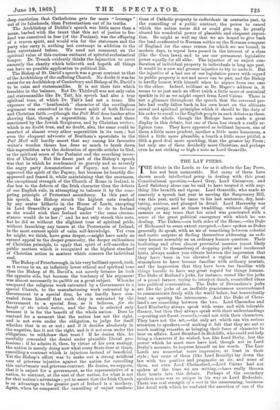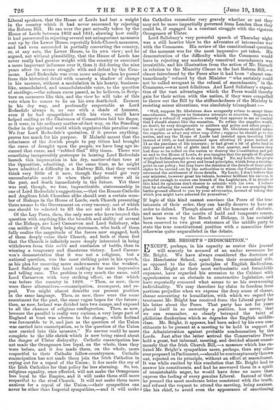THE LAY PEERS. THE LAY PEERS.
THE debate in the Lords, 80 far as it affects the Lay Peers, has not been memorable. Not many of them have shown much intellectual grasp in dealing with this great Constitutional question,—Lord Grey, Lord Oarnarvon, and Lord Salisbury alone can be said to have treated it with anything like breadth and vigour. Lord Granville, who made so masterly a speech last year in moving the Suspensory Bill, was this year, until he came to his last sentences, dry, hesi
tating, anxious, and plunged in detail. Lord Harrowby was simply gossipy, and at times twaddling, without dignity of manner or any trace that his mind was penetrated with a sense of the great political emergency with which he was dealing. The Dukes,—on both sides of the House,—the Duke of Richmond to some extent excepted,—have spoken as Dukes generally do speak, with an air of something between celestial and rustic surprise at finding themselves addressing an ordi nary human assembly on an ordinary human question. Their hesitating and often almost provincial manner (most likely very unjust to themselves) of dropping jerky and incoherent
hints, always makes you vibrate between the impression that they have been in too elevated a region of the human atmosphere to have become familiar with ordinary mortals, and the impression that they have been too familiar with things bucolic to have any great regard for things human. The Duke of Rutland's jerks, for instance, sound like the jerks of a proud farmer, trying to interject dumb, countrified ideas into political conversation. The Duke of Devonshire's jerks are like the jerks of an ineffable graciousness unaccustomed to communicate freely with the world below, but benevolently bent on opening the intercourse. And the Duke of Cleveland's are something between the two. Lord Clarendon and Lord Kimberley always speak with sense and with tolerable fluency, but then they always speak with their understandings —pouring out fluent remark,s,—and not with their characters. They have not the art,—the only art which can win serious attention to speakers,—of making it felt that they are not so much making remarks, as bringing their force of character to bear on affairs. Lord Stratford de Radcliffe, who could not help being a character if he wished, has, like Lord Derby, lost the power which he must once have had, though not in Lord Derby's measure, to impress himself on his words. The Law Lords are somewhat more impressive, at least in their style ; but some of them (like Lord Romilly) lay down the law with too positive and pragmatic an air, and none of them, not even Lord Chelmsford,—Lord Cairns had not spoken at the time we are writing,—have really thrown their hearts into this debate. Perhaps of the secondary speakers none was so unique in his way as Lord Redesdale. There was real strength of a sort in the unassuming, businesslike detail with which he confuted the assertion of one of the Liberal speakers, that the House of Lords had lost a weight in the country which it had never recovered by rejecting the Reform Bill. He ran over the part actually taken by the House of Lords between 1832 and 1841, showing how coolly it had persevered in rejecting several not unimportant measures sent up by the Lower House, especially Irish-Church measures, and had even succeeded in partially converting the country, or, at any rate, the Lower House, to its own view; and he argued, not without plausibility, that the House of Lords has never really had greater weight with the country or exercised a more important influence over it, than it did during the nine years after its severe struggle with and defeat by the Commons. Lord Redesdale was even more unique when he passed from this historical detail with scarcely a shadow of change in his manner, without a modulation in his hearty, businesslike, unmodulated, and unmodulateable voice, to the question of sacrilege,—the solemn curse passed, as he believes, in Scripture on measures like this, and the view he will take of this vote when he comes to lie on his own death-bed. Earnest in his dry way, and profoundly respectable as Lord Redesdale always is, no one with a shade of humour, even if he had sympathized with his view, coul.d have helped smiling as the Chairman of Committees laid his finger, as it were, in his ordinary matter-of-fact way, on the Standing Order in the spiritual world which regulates this peculiar case. We fear Lord Redesdale's quotation, if it proves anything, proves too much for his purpose. If Malachi meant that the reluctance of the Jewish people to pay tithes had brought the curse of drought upon the people, we have long ago incurred that curse, and "robbed God" fifty times. There was something inexpressibly grotesque in hearing Lord Redesdale launch this imprecation in his dry, matter-of-fact tone at the Opposition, admitting, at the same time, as he might have admitted a difficulty in a Railway Bill, that they would think very little of it now, though they would get very uncomfortable under it when their politics were all in the past, and death immediately in the future. Yet there was real, though, we fear, impracticable, statesmanship in one of Lord Redesdale's suggestions,—that the Roman Catholic and Anglican Irish Churches alike should seat a certain number of Bishops in the House of Lords, each Church presenting three names to the Government on every vacancy, out of which one should be selected to fill the see and sit in the Lords.
Of the Lay Peers, then, the only ones who have treated this question with anything like the breadth and ability of several of the Bishops, are Lord Carnarvon and Lord Salisbury, who can neither of them help being statesmen, who both of them fully realize the magnitude of the forces now engaged, both of them deeply value their Church, and both of them feel that the Church is infinitely more deeply interested in being withdrawn from this ntNe's and confusion of battle, than in winning a temporary and disastrous victory. Lord Carnarvon's demonstration that it was not a religious, but a national question, was the most striking point in his speech, as his plea for reserving more endowments was the weakest, Lord Salisbury on this head making a far more impressive and telling case. The problem is very much the same, said Lord Carnarvon with very striking effect, as that which was before the country in 1828. "Then, as now, there were three alternatives,—emancipation, reconquest, and re peal. You might almost describe our present position in the same language. Then, as now, there were the same resentment for the past, the same vague hopes for the future ; then, as now, Ireland was divided into two camps, and exposed to all the chances of religious conflagration. Then, as now, because the parallel is really very curious, a very large part of England at least was adverse to the change, while Ireland was favourable to it, and just as the question of the Union was carried into emancipation, so is the question of the Union now carried into this measure." No answer could be more complete to the idle shriek which is now being raised about the danger of Ulster disloyalty. Catholic emancipation has not made the Orangemen less loyal, on the whole, than they were before, and it has made them, on the whole, more respectful to their Catholic fellow-countrymen. Catholic emancipation has not made them join the Irish Catholics in crying out for a repeal of the Union ; it has made the cry of the Irish Catholics for that policy far less alarming. So, too, religious equality, once effected, will not make the Orangemen less loyal to the Empire, and it will make them still more respectful to the rival Church. It will not make them more anxious for a repeal of the Union,—their sympathies can never be other than Imperial sympathies,—and it will make the Catholics reconsider very gravely whether or not they may not be more impartially governed from London than they could be, if engaged in a constant struggle with the vigorous Orangemen of Ulster.
Lord Salisbury's very powerful speech of Thursday night was a still heavier blow to the advocates of internecine war with the Commons. His review of the constitutional question of the moment was far the most impressive yet taken. His demonstration of the difficulty which the Commons would have in rejecting any moderately conceived amendments was irresistible, and his illustration from the action of Mr. Disraeli in relation to the Minority Clause in the last Reform Bill, —a clause introduced by the Peers after it had been "almost contumeliously" refused by that Minister "who certainly could not be called arrogant in the refusal of amendments," in the Commons,—was most felicitous. And Lord Salisbury's exposition of the vast advantages which the Peers would thereby gain for their action with the nation, if they were compelled to throw out the Bill by the stiffneckedness of the Ministry in resisting minor alterations, was absolutely triumphant suppose Mr. Gladstone does arrogantly refuse to accept these amendments. Suppose he threatens attempts at coercion. Suppose he suggests a refusal of supplies—a remedy that appears to me so comical that I should almost like the sensation. To refuse the supplies would, no doubt, be very disagreeable to soldiers and police and other people ; but it would not much affect us. Suppose Mr. Gladstone should mime the supplies, or adopt any other coup (Taut; suppose he should go to the nation, and say tho House of Lords had insisted upon inserting 1560 instead of 1660, or had determined upon allowing 16 years instead of 14 as the purchase of life interests ; or had given a bit of glebe land in, this quarter and a bit of glebe land in that quarter, and because they had done so he called on the nation to destroy the Constitution and put an end to the House of Lords, do you imagine that the people of England would be foolish enough to do any such thing ? No, my Lords, the people of England interfere for great and broad principles, which form a turningpoint in our policy ; but they leave the decision of the details of those principles to be carried out by the authorities to whom the Constitution has entrusted the settlement of those details. My Lords, I don't believe that any minister, however great his talents, however brilliant his success, is powerful enough to coerce one branch of the Legislature, if in details of this kind its opinions don't chance to coincide with his own. I believethat by refusing the second reading of this Bill you are accepting the battle-ground offered to you by your adversaries, instead of taking that which you might have selected for yourselves."
If logic of this kind cannot convince the Peers of the true interests of their order, they can hardly deserve to have an order to defend. Though almost all the honours of rhetoric, and most even of the merits of lucid and temperate reason, have been won by the Bench of Bishops, it has certainly been reserved to two great statesmen of the middle party tostate the true constitutional position with a masculine force' otherwise quite unparalleled in the debate.































 Previous page
Previous page